Ένα μπάνιο πρέπει να είναι ασφαλές, άνετο και όμορφο. Και ένας από τους παράγοντες είναι ο φωτισμός. Γι' αυτό θα πρέπει να επιλέγετε συνειδητά τα φωτιστικά του μπάνιου, λαμβάνοντας υπόψη όχι μόνο το αισθητικό στοιχείο, αλλά και την ασφάλεια. Επιπλέον, τα φωτιστικά πρέπει να δίνουν αρκετό φως στα σωστά σημεία.
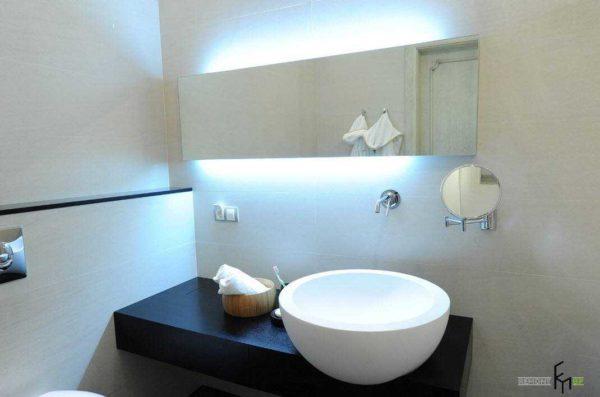
Περιεχόμενο άρθρου
Πώς να εξασφαλίσετε την ηλεκτρική ασφάλεια στο μπάνιο
Στο μπάνιο, αξίζει να δώσετε ιδιαίτερη προσοχή στην ασφάλεια: το νερό και ο ηλεκτρισμός είναι ένας πολύ επικίνδυνος συνδυασμός. Υπάρχουν δύο τρόποι:
- να χρησιμοποιείτε τη συνήθη παροχή ρεύματος 220 V, αλλά να επιλέγετε συσκευές με υψηλή ηλεκτρική ασφάλεια,
- μειώστε την τάση στα 24 V ή στα 12 V με τη χρήση κατάλληλων φωτιστικών χαμηλής τάσης.
Υπάρχει στην πραγματικότητα ένας τρίτος τρόπος - να χρησιμοποιήσετε για φωτισμό ασύρματα φωτιστικά τοίχου με μπαταρίες. Διαθέτουν LED, έτσι ώστε να καταναλώνουν λίγη ενέργεια και να διαρκούν αρκετά μεγάλο χρονικό διάστημα. Αλλά αυτή η επιλογή δεν μπορεί να δώσει πλήρη φωτισμό.
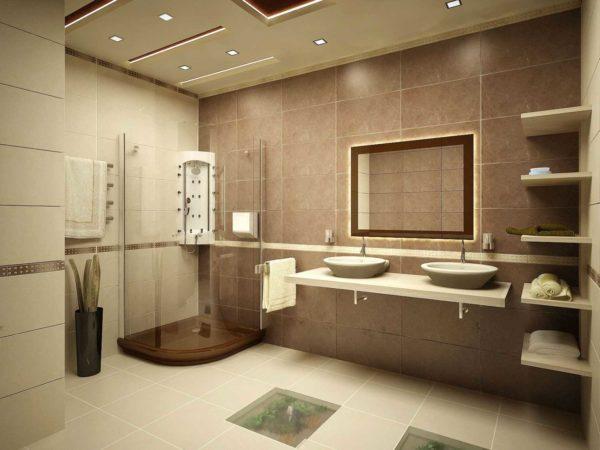
Με τη μείωση της τάσης δεν είναι επίσης εύκολο. Εκτός από τον μετασχηματιστή υποβιβασμού, θα πρέπει ακόμη να βρείτε τα κατάλληλα φωτιστικά για την περιοχή αυτή. Υπάρχουν, βέβαια, αλλά ο σχεδιασμός τους, για να το θέσουμε ήπια, δεν θα είναι πάντα σε θέση να ικανοποιήσει τα απαιτητικά γούστα.
Η πιο συνηθισμένη προσέγγιση είναι να επιλέξετε φωτιστικά για το μπάνιο με αυξημένη αντοχή στην υγρασία - αδιάβροχα. Αλλά, επιπλέον, για να εξασφαλιστεί η ασφάλεια, στο μπάνιο τραβήξτε μια ξεχωριστή γραμμή ρεύματος, με το δικό του RCD και διακόπτη κυκλώματος. Αυτό εγγυάται τη δυνατότητα γρήγορης απενεργοποίησης του δωματίου, αν χρειαστεί, και αυτόματη διακοπή ρεύματος σε περίπτωση του παραμικρού προβλήματος.
Κατηγορία προστασίας των φωτιστικών σωμάτων μπάνιου
Για την ταξινόμηση της προστασίας των συσκευών έχει αναπτυχθεί ένα ειδικό σύστημα. Η κατηγορία ασφαλείας της συσκευής (του περιβλήματός της) εμφανίζεται με δύο ψηφία και τα λατινικά γράμματα IP μπροστά τους. Το πρώτο ψηφίο δείχνει πόσο προστατεύεται η συσκευή από τη σκόνη και τα ξένα αντικείμενα που μπαίνουν στο εσωτερικό της, δείχνει επίσης την ασφάλεια της αφής, το δεύτερο ψηφίο δείχνει το βαθμό προστασίας από το νερό και τις πιτσιλιές νερού. Η ελάχιστη προστασία είναι 0, όσο μεγαλύτερος είναι ο αριθμός, τόσο μεγαλύτερη είναι η προστασία. Τα ακριβή στοιχεία φαίνονται στον πίνακα.

Στο μπάνιο, οι συνθήκες λειτουργίας του ηλεκτρικού εξοπλισμού εξαρτώνται από τη θέση. Κοντά στην μπανιέρα, το νιπτήρα ή το ντους, υπάρχει μεγάλη πιθανότητα να εισχωρήσει νερό στη συσκευή με τον έναν ή τον άλλο τρόπο. Επειδή αυτά στην περιοχή προσπαθήστε να μην τοποθετείτε φώτα και αν είναι απαραίτητο (ή πολύ επιθυμητό), τότε χρησιμοποιήστε θήκες με υψηλό βαθμό προστασίας, όχι χαμηλότερο από IP67 (εικόνα παρακάτω). Τέτοιες συσκευές φωτισμού τοποθετούνται στη δεξαμενή της μπανιέρας, για φωτισμό ή απευθείας στην καμπίνα του ντους. Όπως προκύπτει από τον πίνακα, ένα τέτοιο περίβλημα δεν παίρνει νερό ακόμη και όταν βυθίζεται σε βάθος 1 μέτρου. Αυτή η κατηγορία φώτων για το μπάνιο θα κοστίσει πολύ, οπότε αν χρησιμοποιούνται, χρησιμοποιούνται σε καμπίνες ντους.
Ακριβώς πάνω από την μπανιέρα σε ύψος 2,25 μέτρων είναι η ζώνη στην οποία πρέπει να χρησιμοποιείται αποδεκτό περίβλημα με προστασία όχι χαμηλότερη από IP 65, με προστασία από την άμεση είσοδο νερού. Η ίδια ζώνη βρίσκεται σε άμεση γειτνίαση με τον νιπτήρα - 60 cm από τη βρύση προς τα πλάγια και προς τα πάνω.
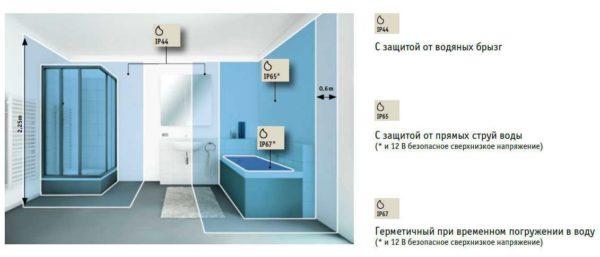
Τα φωτιστικά για το μπάνιο κατηγορίας IP 65 κοστίζουν επίσης πολύ. Για το λόγο αυτό, και εδώ και να εγκαταστήσετε φωτιστικά είναι πολύ σπάνια. Δεν είναι κακό θα αισθάνονται καλά, εκτός από τις ταινίες LED σε έκδοση ανθεκτική στην υγρασία. Μπορούν, κατ 'αρχήν, μπορεί ακόμη και να βυθιστεί στο νερό και το κόστος τέτοιες ταινίες είναι σχετικά φθηνή, αλλά θα πρέπει να τροφοδοτούνται από πηγές χαμηλής ισχύος, έτσι ώστε για την κανονική λειτουργία απαιτεί ένα τροφοδοτικό που μειώνει την τάση σε αποδεκτή.
Στο ίδιο ύψος - 2,25 μέτρα και πλάτος 0,6 μέτρα γύρω από την μπανιέρα και την καμπίνα ντους, είναι πολύ πιθανό να υπάρχουν πιτσιλιές. Ως εκ τούτου, σε αυτή την περιοχή τοποθετήστε φώτα για το μπάνιο με βαθμό προστασίας τουλάχιστον IP 44 με προστασία από πιτσιλιές.
Τύποι φωτιστικών που χρησιμοποιούνται στα μπάνια
Ο φωτισμός στο μπάνιο γίνεται κυρίως με τον παραδοσιακό τρόπο, εγκαθιστώντας λαμπτήρες στην οροφή. Και επίσης χρησιμοποιούνται φώτα τοίχου ή φώτα καθρέφτη.
Φώτα οροφής
Τα φωτιστικά οροφής για εγκατάσταση στο μπάνιο είναι δύο τύπων - χωνευτά και επιφανειακά. Τα εντοιχιζόμενα χρησιμοποιούνται με ψευδοροφές (από γυψοσανίδα ή πλαστικά πάνελ) ή τεντωμένες οροφές. Το ιδιαίτερο χαρακτηριστικό τους είναι ότι το μεγαλύτερο μέρος του περιβλήματος βρίσκεται πίσω από το επίπεδο της οροφής. Εξωτερικά παραμένει μια διακοσμητική επικάλυψη και μέρος του λαμπτήρα.
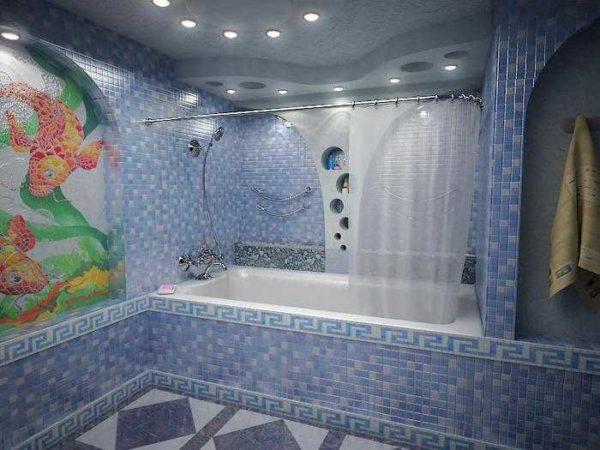
Η κατηγορία προστασίας επιλέγεται ανάλογα με τη θέση εγκατάστασης. Έξω από περιοχές με ειδικές απαιτήσεις μπορούν να εγκατασταθούν περιβλήματα με κλάση προστασίας από πιτσιλιές τουλάχιστον 1 (προστασία από κάθετες πιτσιλιές), ενώ η προστασία από τη σκόνη συνήθως δεν είναι τυποποιημένη.
Οι λαμπτήρες που είναι ενσωματωμένοι σε προβολείς για το μπάνιο είναι καλύτερα να τοποθετηθούν LED. Καταναλώνουν ελάχιστη ηλεκτρική ενέργεια και ταυτόχρονα λάμπουν έντονα, δεν θερμαίνονται σχεδόν καθόλου και έχουν μεγάλη διάρκεια ζωής.
Η δεύτερη επιλογή έχει μια πιο παραδοσιακή εμφάνιση, είναι τα φωτιστικά οροφής. Αποτελούνται από ένα περίβλημα που είναι προσαρτημένο στην οροφή και ένα πλατό. Μεταξύ αυτών των μοντέλων, υπάρχουν αρκετά με υψηλή κατηγορία προστασίας, με μια τέτοια δομή δεν είναι δύσκολο να επιτευχθεί στεγανότητα. Για το σκοπό αυτό, χρησιμοποιείται συνήθως ένα ελαστικό παρέμβυσμα.
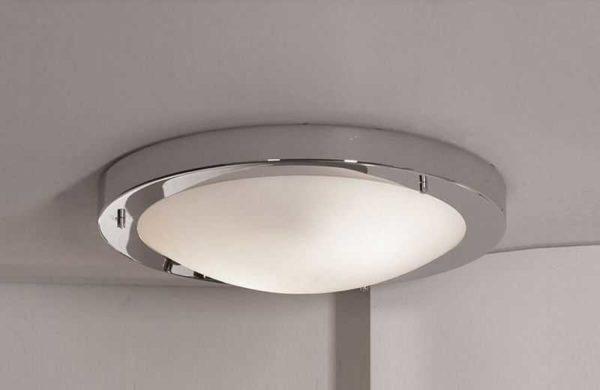
Το εύρος τόσο αυτών όσο και άλλων συσκευών φωτισμού είναι μεγάλο, επιπλέον, μπορούν να συνδυαστούν. Μπορούν να χρησιμοποιηθούν για τη δημιουργία ενός μοναδικού σχεδιασμού που να πληροί πλήρως τόσο τις απαιτήσεις ασφαλείας όσο και να παρέχει επαρκή φωτισμό.
Επιτοίχια τοποθέτηση
Ακόμη και με καλό φωτισμό οροφής, σπάνια υπάρχει αρκετό φως στην περιοχή του καθρέφτη. Για το λόγο αυτό, στο μπάνιο εγκαθίστανται επίσης φωτιστικά τοίχου.
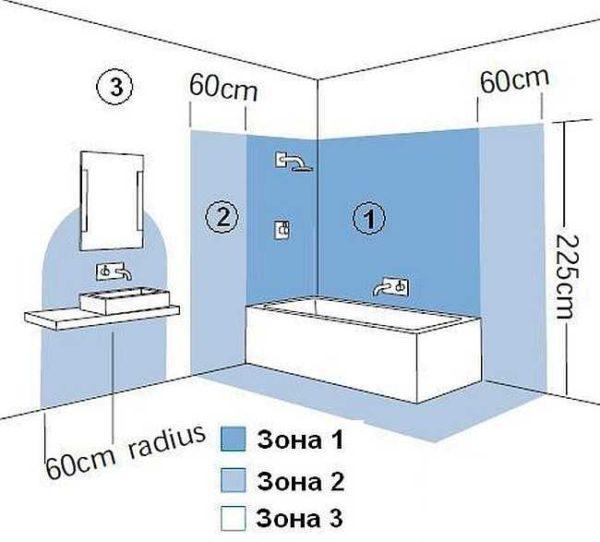
Ανάλογα με το πού σκοπεύετε να τοποθετήσετε το φωτιστικό, μπορεί να είναι IP 44 (ζώνη 2) ή IP 21, 31, 41 κ.λπ. Ο δεύτερος αριθμός μπορεί να είναι ακόμη υψηλότερος.
Ως εκ τούτου, είναι λογικό να τοποθετήσετε φώτα για το μπάνιο πάνω από τον καθρέφτη ή να χρησιμοποιήσετε ταινία LED με μόνωση υγρασίας (σε σωλήνα πολυμερούς) περιμετρικά του καθρέφτη. Το φως σε αυτή την περίπτωση κατανέμεται ομοιόμορφα, γεγονός που είναι βολικό για το ξύρισμα και τις καλλυντικές διαδικασίες.
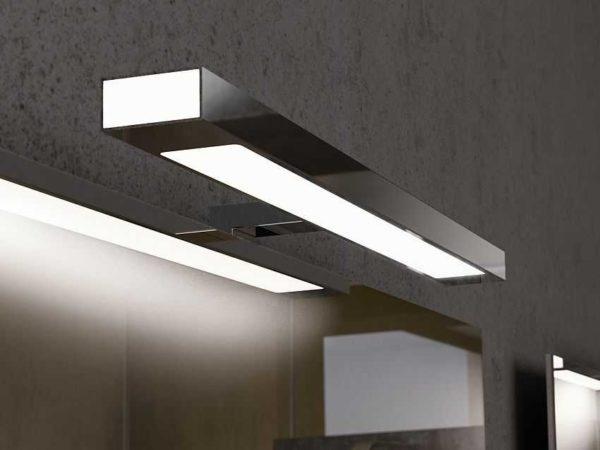
Μια άλλη επιλογή είναι να εγκαταστήσετε προβολείς τοίχου, οι οποίοι διαθέτουν κινητό σταθερό πλατό. Σας επιτρέπουν να κατευθύνετε τη ροή του φωτός στην επιθυμητή περιοχή. Αγαπούνται από τους διακοσμητές, καθώς δημιουργούν ενδιαφέροντα εφέ, αναδεικνύοντας ένα στενό τμήμα του τοίχου.
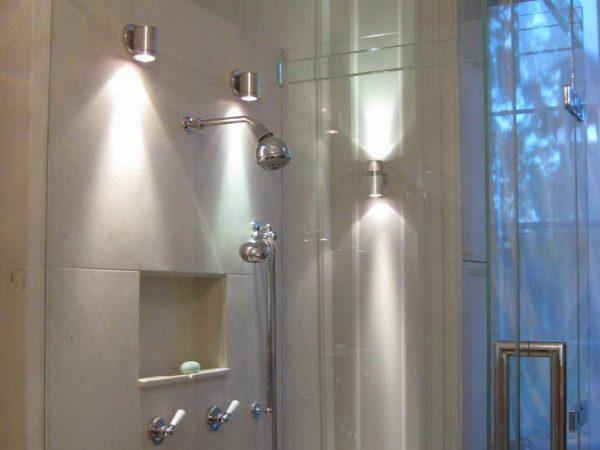
Ο συνδυασμός φωτιστικών οροφής και τοίχου για το μπάνιο θα σας επιτρέψει σίγουρα να έχετε την ένταση του φωτός που θέλετε. Επιπλέον, είναι δυνατόν να αλλάξετε το βαθμό φωτισμού κατά βούληση, ενεργοποιώντας και απενεργοποιώντας ορισμένα από τα φωτιστικά σώματα.
Πολυέλαιοι
Οι πολυέλαιοι χρησιμοποιούνται σπάνια στα μπάνια μας. Σε μικρά δωμάτια μοιάζουν με ξένο στοιχείο, καθώς τα περισσότερα από αυτά απαιτούν μεγάλο χώρο.
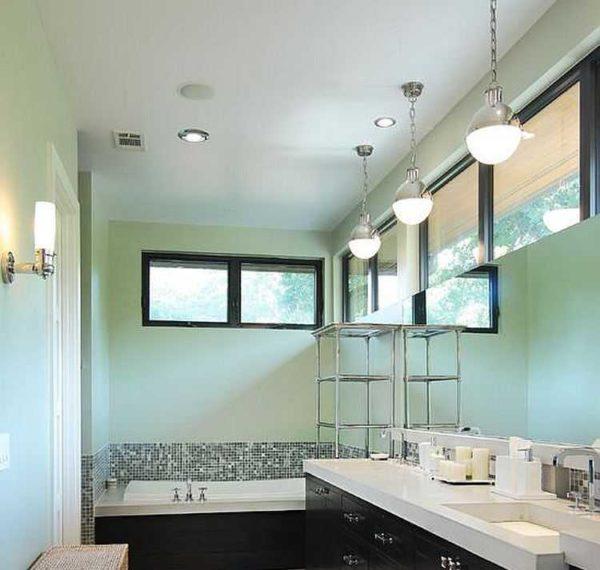
Αν υπάρχει ένα καλλιτεχνικό ταλέντο μπορεί να καταλήξει σε κάτι και με πολυελαίους για να βελτιώσει το εσωτερικό του μπάνιου. Αλλά είναι καλύτερα να επιλέξετε από μικρά λακωνικά μοντέλα, τα οποία, πρώτον, μπορούν να δώσουν αρκετό φως και, δεύτερον, θα πληρούν τις απαιτήσεις της ασφάλειας.
Πρόσθετες δυνατότητες
Το λουτρό δεν είναι μόνο ένας χρηστικός χώρος για διαδικασίες υγιεινής. Σε ένα ζεστό μπάνιο μπορείτε να χαλαρώσετε, να ξεκουραστείτε, να ανακουφιστείτε από το άγχος. Για τέτοιες περιπτώσεις, μπορείτε να κάνετε φωτισμό. Για αυτό χρησιμοποιήστε και πάλι LED-ταινίες, αλλά όχι λευκές, οι οποίες λαμβάνονται για φωτισμό, και χρωματιστές, για να δημιουργήσετε μια πιο απαλή ατμόσφαιρα που προάγει τη χαλάρωση.
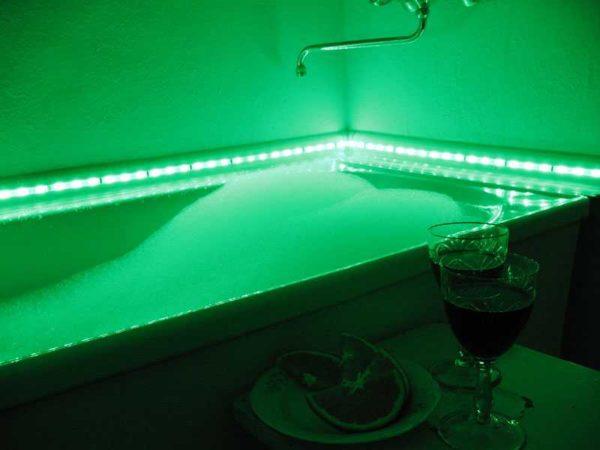
Υπάρχουν λωρίδες LED που μπορούν να αλλάξουν τα χρώματα της λάμψης. Εκπέμπουν λιγότερο φως και δεν χρησιμοποιούνται για βασικό φωτισμό, αλλά για ανάδειξη - το ίδιο το πράγμα, επειδή μπορείτε, ανάλογα με τη διάθεσή σας, να επιλέξετε το χρώμα.
Για όσους θέλουν να δημιουργήσουν ένα μοναδικό σχεδιασμό μπάνιου, υπάρχει μια άλλη ενδιαφέρουσα και μέχρι στιγμής ελάχιστα χρησιμοποιούμενη ευκαιρία - να κάνουν οπίσθιο φωτισμό στο πάτωμα. Πρόκειται για μια πολύπλοκη εργασία, αλλά το αποτέλεσμα είναι πολύ ενδιαφέρον.
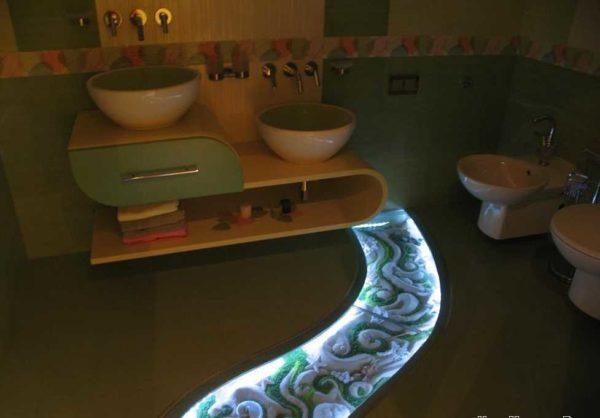
Γενικά, η επιλογή των φωτιστικών σωμάτων για το μπάνιο είναι μια δημιουργική διαδικασία. Αλλά ταυτόχρονα μην ξεχνάτε την ασφάλεια.

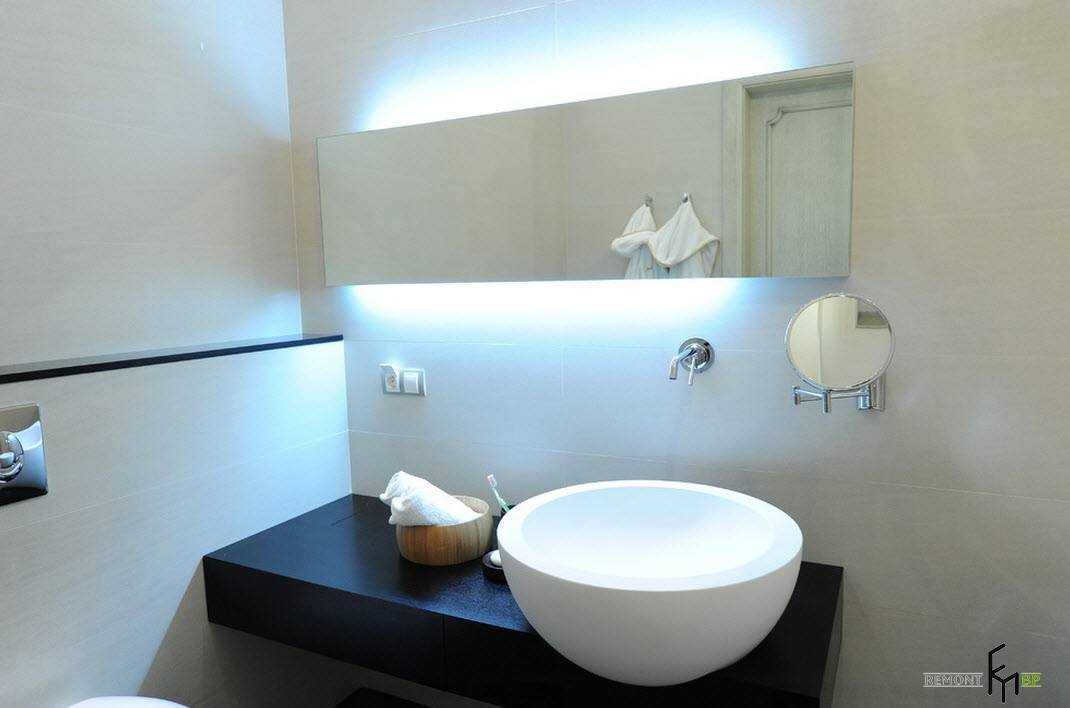

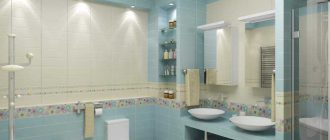
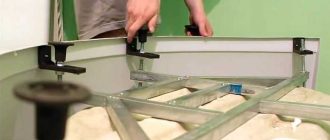
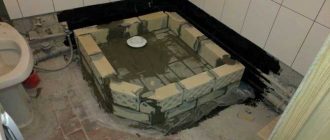
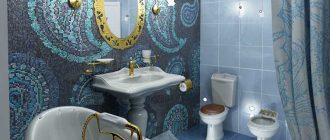
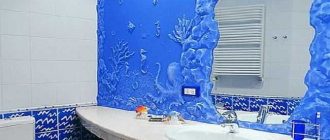
Η επιλογή των εξαρτημάτων μπάνιου μπορεί να αλλάξει τα δεδομένα του παιχνιδιού! Όταν ανακαίνισα το μπάνιο μου, επέλεξα κομψές, μοντέρνες βρύσες που πραγματικά ξεχωρίζουν. Απλά να θυμάστε, το θέμα είναι να βρείτε κομμάτια που ταιριάζουν με το στυλ σας και είναι εύκολα στο καθάρισμα. Θα λατρέψετε την αναβάθμιση!
Η επιλογή των εξαρτημάτων μπάνιου μπορεί να αλλάξει τα δεδομένα! Θυμάμαι όταν αναβάθμισα την κεφαλή του ντους μου και ένιωθα σαν σπα κάθε πρωί. Φροντίστε απλώς να ταιριάζουν τα στυλ και να ελέγχετε την ποιότητα. Πραγματικά κάνει τη διαφορά στο χώρο σας και την ατμόσφαιρα!
Totally agree! I swapped out my old faucet for a sleek one last month, and it transformed my kitchen. Every time I wash dishes, it feels so much more enjoyable. Definitely a little upgrade that packs a punch! Quality really does make all the difference.
Choosing bath fixtures can be a blast! I remember picking out my first set; I went for sleek designs that matched my vibe. It’s all about finding what feels right for you. Don’t rush it—take your time and enjoy the process! Happy decorating!